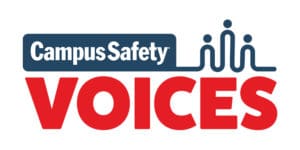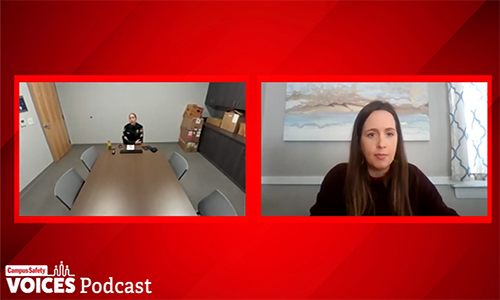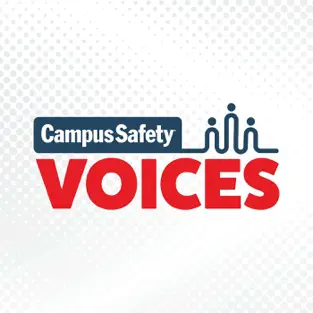You can watch or listen to the full podcast interview above. If you prefer to listen on-the-go, you can download the podcast to your mobile device on iTunes and Spotify! Make sure to follow or subscribe on your platform of choice to be alerted of the latest episodes as soon as they become available.

Campus Safety Voices, available on Spotify and Apple streaming platforms, features timely conversations on a wide range of topics affecting K-12 schools, institutions of higher education, and healthcare facilities.
Virtually everyone in the United States and in many other parts of the world has been affected by the coronavirus pandemic in one way or another. Some have been more significantly impacted by others, including healthcare workers, the elderly, those with underlying health conditions, and already underserved and underprivileged populations.
Another drastically affected group many may not think of are those who are struggling with homelessness.
Last year, I had the privilege of speaking with Sergeant Antonia “Toni” Summerlin with University Police Services Southern Command about how it established its homeless outreach unit back in 2019. University Police Services serves four college campuses, including the University of Nevada, Las Vegas (UNLV), College of Southern Nevada, Nevada State College and Desert Research Institute.
The primary mission of the unit is to connect both affiliated and non-affiliated homeless populations with available resources in surrounding communities and on its campuses. However, just like nearly everything other aspect of daily life, the unit’s mission was severely thwarted by the pandemic.
“COVID has definitely put a damper on a lot of the stuff that we’re doing and how we’re doing it — especially for some of these community-based resources too — because they had to [stop operating] face-to-face,” Summerlin told Campus Safety. “When the governor shut everything down in Las Vegas, that included those places where we were normally taking people or sending people. So those that maybe didn’t have transportation or a way to get there — even if they could — those facilities were shut down. So it was trying to figure out, okay, what do we do now that those facilities aren’t open and running due to the governor’s orders, which everybody needed to follow at that time.”
Under those orders, all four campuses were shut down as well for a period of time, and many homeless individuals in the area regularly relied on the campuses for services or food.
“A lot of them utilized the rec center as a place to shower and wash their clothes and work out. Then they would go into our student unions and grab a bite to eat,” says Summerlin. “Well, when that all closed down because we shut down as a university to protect the faculty, staff and students, we didn’t see some of those individuals anymore and a lot of these people we had ongoing relationships with. They were a huge part of our community — we knew them on a first-name basis. So now, we haven’t’ seen them for going on a year and it’s like, well, where did they go? Are they okay?”
Since the shutdown, the campuses have reopened to some capacity and some students have returned to dorms at UNLV and Nevada State. However, many of the communal facilities used by non-affiliated individuals remain closed as coronavirus cases remain high.
As for campus affiliates facing instability, throughout the shutdown, UNLV and Nevada State were able to keep some dorm rooms open for students that would otherwise have nowhere else to go — whether due to homelessness or the inability to fly back to their home countries because of international restrictions or affordability.
Additional services were put in place for these students, including food donations from state park convenience stores which were also shuddered early on in the pandemic.
“They had all this food and sandwiches and yogurt and juices that were going to expire. So what the state’s parks police did through our officer, who is one of our part-timer, is they donated all of that food to our residential dorms,” Summerlin says. “So our students who maybe didn’t have the funds to go get food off campus — because now they’re not just experiencing homelessness, they’re experiencing food insecurity — we were able to provide that to them and then they did some cool meal plans where they were making sure students got fed.”
Summerlin further discussed protections that have been put in place to support students who are faced with homelessness, and how the unit continued to connect the homeless population to resources in the community during a global pandemic.
In addition, we discussed how the unit saw an influx in individuals needing more mental health supports, barriers homeless individuals may find in getting the COVID-19 vaccine, and what’s next for the homeless outreach unit, including new partnerships that are in the works. We even had the chance to speak about how this summer’s protests of racial injustices and how anyone can help the homeless population through this difficult time.
By the way — Sergeant Summerlin is presenting at the Campus Safety Conference (CSC) West on addressing homelessness on an urban campus. CSC West will take place June 14-16 in Las Vegas, Nevada. For more information on all of this year’s CSCs (CSC East is July 11-13 in Bethesda, Maryland, and CSC Texas is July 21-23 in San Antonio, Texas), click here.
Click below to listen to the podcast on Spotify
Click below to listen to the podcast on Apple Podcasts









